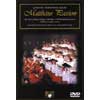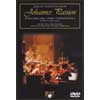Bach St John Passion
A well-rounded St Matthew, despite swimming in the King’s acoustic, and a generally less convincing St John
View record and artist detailsRecord and Artist Details
Composer or Director: Johann Sebastian Bach
Genre:
DVD
Label: Brilliant Classics
Magazine Review Date: 9/2003
Media Format: Digital Versatile Disc
Media Runtime: 165
Mastering:
Stereo
Catalogue Number: 99781

Tracks:
| Composition | Artist Credit |
|---|---|
| St Matthew Passion |
Johann Sebastian Bach, Composer
(The) Brandenburg Consort Cambridge Jesus College Choir David Thomas, Bass Emma Kirkby, Soprano Johann Sebastian Bach, Composer King's College Choir, Cambridge Martyn Hill, Tenor Michael Chance, Alto Michael George, Bass Rogers Covey-Crump, Tenor Stephen Cleobury, Conductor |
Composer or Director: Johann Sebastian Bach
Genre:
DVD
Label: Brilliant Classics
Magazine Review Date: 9/2003
Media Format: Digital Versatile Disc
Media Runtime: 115
Mastering:
Stereo
Catalogue Number: 99780

Tracks:
| Composition | Artist Credit |
|---|---|
| St John Passion |
Johann Sebastian Bach, Composer
(The) Brandenburg Consort Catherine Bott, Soprano Johann Sebastian Bach, Composer John Mark Ainsley, Tenor King's College Choir, Cambridge Michael Chance, Alto Paul Agnew, Tenor Stephen Cleobury, Conductor Stephen Richardson, Bass Stephen Varcoe, Bass |
Author: Jonathan Freeman-Attwood
Stephen Cleobury chooses the 1725 version of the St John in which Bach used, as his opening chorus, the music for the closing chorus of Part 1 of the St Matthew Passion (‘O Mensch, bewein’). I’ve always thought this to be a curious move by Bach; whether it is a matter of contextual assimilation or a genuine sense of displacement, this fine movement conveys more a sense of taking stock and gathering up than setting scenes. There are other changes to the original Bach version of a year earlier (to which, incidentally, he later reverted), such as the theatrical virtuoso aria, ‘Zerschmettert mich’, which replaces ‘Ach, mein Sinn’.
It is still good to be reminded of this alternative text even if the lack of graphic foreboding, as one gets in the other chorus, results in a somewhat tentative opening ‘tableau’. The soloists appear tense (far too much copy-gazing) and only the direct and stern delivery of the Evangelist, John Mark Ainsley, reveals the essence of an intense and life-changing journey. He sings directly to the camera while assuring a clear demarcation between regaling fact and representing the emotional high points, such as his extraordinary melisma on Peter’s heart-wrenching denial. There are fine contributions, especially from Stephen Varcoe (as a highly-motivated Pilate and bass soloist) and an exceptionally immediate and affecting ‘Es ist Vollbracht’ from Michael Chance. Elsewhere, the impression is one of a well-prepared ensemble of choir and orchestra, asked to play by the book – but not to relive the passion story with excessive realism or much interpretative personality.
There is a far greater sense of atmosphere in the St Matthew performance, mainly on account of greater reflective elements within a larger musical edifice but also the more spacious and graceful approach to the music-making. The opening chorus is eloquently performed. The Choir of King’s are on top form throughout, each contribution as eagerly anticipated as the preceding one. So, too, are the excellent obbligato performances from the Brandenburg Consort.
Rogers Covey-Crump brings his time-honoured intelligence to proceedings, fastidious in enunciation and tasteful to a fault. The problem with the soloists, en masse, is the lack of definition in sound: the building wins over vocal clarity in a way that is more effectively realised in the St John. Even so, nothing can detract from the radiance of Emma Kirkby in ‘Blute nur’ or in the never-flagging duet ‘So ist mein Jesus nun gefangen’ (arguably the most mysterious music in the work), with Michael Chance, who presents his varied and substantial role with colour and unremitting expressivity. Michael George is the archetypal authoritative and dependable Christus – vocally impressive as ever where David Thomas’s communicative abilities and characterisation tend to impress more consistently than a universally compelling vocal presence. I was disappointed with the mundane valediction of the final numbers but Cleobury projects an unfettered (apart from simulated lightning outside the chapel windows for ‘Sind blitze und donner’!) and musicianly view which works far more successfully over a large span than his performance of the St John.
Discover the world's largest classical music catalogue with Presto Music.

Gramophone Digital Club
- Digital Edition
- Digital Archive
- Reviews Database
- Full website access
From £8.75 / month
Subscribe
Gramophone Full Club
- Print Edition
- Digital Edition
- Digital Archive
- Reviews Database
- Full website access
From £11.00 / month
Subscribe
If you are a library, university or other organisation that would be interested in an institutional subscription to Gramophone please click here for further information.




